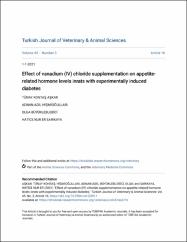Effect of vanadium (IV) chloride supplementation on appetite-related hormone levels in rats with experimentally induced diabetes

Göster/
Erişim
info:eu-repo/semantics/openAccessAttribution 3.0 United Stateshttp://creativecommons.org/licenses/by/3.0/us/Tarih
2021Üst veri
Tüm öğe kaydını gösterÖzet
Vanadium is one of the essential trace elements for mammals, which has important functions in the metabolism of
carbohydrates. There is limited data about the effects of vanadium (IV) chloride supplementation on appetite-related hormones in
literature. Our target was to analyse the impacts of vanadium supplementation on appetite-related hormone (leptin, nesfatin-1 and
apelin) levels in rats with experimentally induced diabetes. Twenty eight male Sprague–Dawley albino rats were used in this study.
After formation of diabetes, 0.3 mg/mL of vanadium was added to drinking water of rats for four weeks. A substantial increment was
found in serum glucose (p < 0.001), HbA1c (p < 0.001), HOMA-IR (p < 0.01), and leptin (p < 0.001) levels and a significant decrease in
insulin, apelin and nesfatin-1 concentrations in diabetic rats. Moreover, blood glucose, HbA1c, HOMA-IR, and leptin levels decreased
in diabetic + vanadium group, but nesfatin-1 (1.74 ± 0.94 ng/mL), apelin (1.74 ± 0.94 ng/mL), and insulin concentrations were found
higher compared with the diabetic group. As a result of this study, vanadium has increased the levels of circulating nesfatin-1 and apelin
levels in diabetic rats while decreasing blood glucose and leptin concentrations. But further studies are required to determine the blood
glucose lowering effects of vanadium and its relationship with appetite related hormones in diabet.
Kaynak
Turkish Journal of Veterinary and Animal SciencesCilt
45Sayı
3Koleksiyonlar
Aşağıdaki lisans dosyası bu öğe ile ilişkilidir:


















